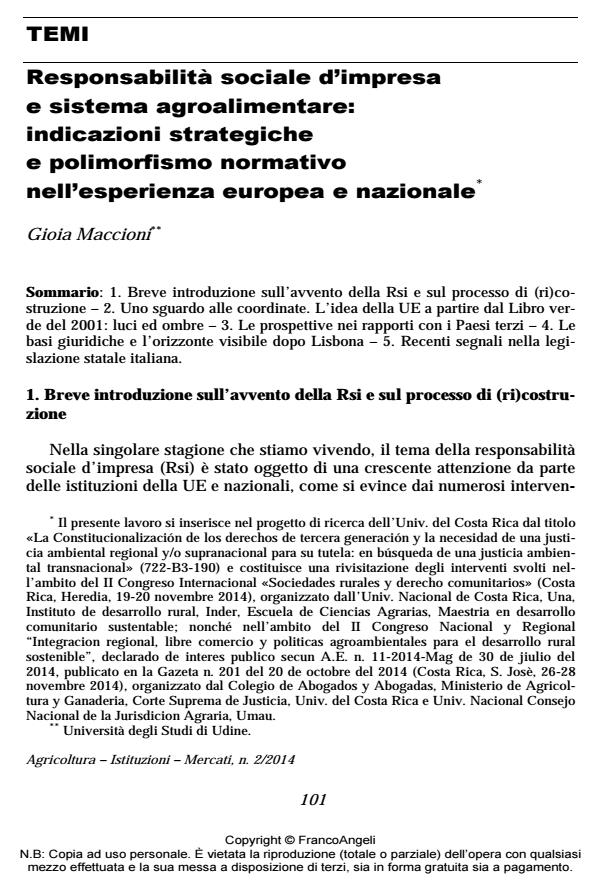Corporate Social Responsability and Agri-food System: Strategic Guidelines and Normative Polymorphism in the European and National Experience
Journal title AGRICOLTURA ISTITUZIONI MERCATI
Author/s Gioia Maccioni
Publishing Year 2015 Issue 2014/2
Language Italian Pages 31 P. 101-131 File size 146 KB
DOI 10.3280/AIM2014-002005
DOI is like a bar code for intellectual property: to have more infomation
click here
Below, you can see the article first page
If you want to buy this article in PDF format, you can do it, following the instructions to buy download credits

FrancoAngeli is member of Publishers International Linking Association, Inc (PILA), a not-for-profit association which run the CrossRef service enabling links to and from online scholarly content.
European Commission has played a pioneering role in the development of public policy to promote Crs ever since its 2001 Green Paper and the establishment of the European Multistakeholder Forum on Crs. In 2006 the Commission published a new policy whose centrepiece was strong support for a business-lead initiative called the European Alliance for Crs. The policy also identified many priority areas for EU action: awareness-raising and best practice exchange; support to multistakeholder initiatives; cooperation with Member States; consumer information and transparency; research; education; small and medium-sized enterprises; and the international dimension of Crs. In a widely changed but still evolving context, agri-food enterprises have been demonstrating socially responsible attitudes towards the common good and social welfare leading to a new business ethical dimension. In the light of a reforming prospective, agri-food enterprises are rethinking their traditional productive, economic and organizational schemes: an original way of looking at the multifunctional and sustainable farm. These enterprises are also reshaping their relationships with the other agri-food stakeholders by adopting socially responsible behaviour. What is Crs today? The Commission puts forward a new definition of Csr as "he responsibility of enterprises for their impacts on society". The Commission orientation has been widely presented in its Communication (Com, 2011, 281). Respect for applicable legislation, and for collective agreements between social partners, is a prerequisite for meeting that responsibility. To fully meet their corporate social responsibility, enterprises should have in place a process to integrate social, environmental, ethical, human rights and consumer concerns into their business operations and core strategy in close collaboration with their stakeholders, with the aim of: - maximising the creation of shared value for their owners/shareholders and for their other stakeholders and society at large; - identifying, preventing and mitigating their possible adverse impacts. Why is Crs important? In the EU progress, the European Commission believes that Csr is important for the sustainability, competitiveness, and innovation of EU enterprises and the EU economy. In the interest of enterprises, Crs provides important benefits to companies in risk management, cost savings, access to capital, customer relationships, management, and their ability to innovate. In the interest of the EU economy, Crs makes companies more sustainable and innovative. In the interests of society, Crs offers a set of values on which we can build a more cohesive society and base the transition to a sustainable economic system. The aim of this work is to analyse social responsibility in the applicable and in progress legislation. In this analytical perspective, the research permits to highlight some new interpretation models of sustainable agri-food enterprises and their related strategic behavior; however we have noted its shortcomings before putting in place a permanent solution. There are many reasons for low levels of Crs design in front of contemporary challenges in the most recent legislative interventions, in the context of the new challenges and in the Common Agricultural Policy, which are to imperfect moments, not only to structural barriers and to the presence of market failures.
Keywords: Corporate social responsibility (Csr); Csr and Agri-food System; Multifunctionality; Pluriactivity; Agri-food markets; European and national legislation.
- L'agricoltura sociale: profili giuridici Gioia Maccioni, in AGRICOLTURA ISTITUZIONI MERCATI 2/2017 pp.154
DOI: 10.3280/AIM2015-002010
Gioia Maccioni, Responsabilità sociale d’impresa e sistema agroalimentare: indicazioni strategiche e polimorfismo normativo nell’esperienza europea e nazionale in "AGRICOLTURA ISTITUZIONI MERCATI " 2/2014, pp 101-131, DOI: 10.3280/AIM2014-002005